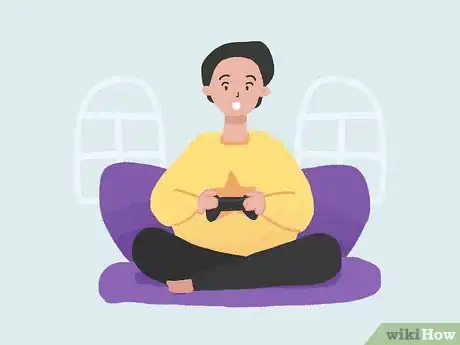This article was co-authored by Kelli Miller, LCSW, MSW. Kelli Miller is a Psychotherapist based in Los Angeles, California. Kelli specializes in individual and couples therapy focusing on relationships, depression, anxiety, sexuality, communication, parenting, and more. Kelli also facilitates groups for those struggling with alcohol and drug addiction as well as anger management groups. She is the author of “Professor Kelli’s Guide to Finding a Husband” and the award-winning and best-selling book “Thriving with ADHD”. Kelli co-hosted an advice show on LA Talk Radio and is a relationship expert for The Examiner. She received her MSW (Masters of Social Work) from the University of Pennsylvania and a BA in Sociology/Health from the University of Florida.
There are 8 references cited in this article, which can be found at the bottom of the page.
This article has been viewed 35,558 times.
If you’re looking to try to be more mature in relationship, that’s so great! Being emotionally mature is the secret to a lasting, intimate relationship—it makes both you and your partner happier. It’s also not as difficult to do as you might think. With the right mindset and strategies, you can make positive changes that will lead to a happier relationship. To help you out, we’ve put together a list of tools and tactics you can use to do just that.
Steps
Embrace change in your relationship.
-
It’s the only way you can experience positive growth. In order to act more mature in your relationship, you have to actively seek out change that will make it happen. Start by opening your mind to the possibility of change. That way, you’ll be more welcoming of opportunities to act more maturely when they appear.[1] X Trustworthy Source HelpGuide Nonprofit organization dedicated to providing free, evidence-based mental health and wellness resources. Go to source
- For example, you can tell yourself something like, “I’m going to try to find a mature solution before I say or do something.”
Talk to your partner if something is bothering you.
-
It’s important that you talk to them about your feelings. If you’re feeling upset or hurt, try talking to your partner honestly and openly about it. Stay calm and simply express yourself instead of keeping your emotions bottled up. It can make you feel better and it’ll bring you closer to your partner.[2] X Expert Source

Psychotherapist Expert Interview. 22 June 2020. [3] X Research source- For instance, if your partner said or did something that made you feel upset, try saying something like, “Hey, I just want you to know that it hurts my feelings when you talk to me like that.”
Use "I" phrases instead of “you” phrases.
-
"You" phrases tend to lead to negative criticism and blame. Talk about how you’re feeling or about how something your partner does makes you feel. Try not to put all of the blame for something on them and avoid using absolutes like “always” and “never.”[4] X Expert Source

Psychotherapist Expert Interview. 22 June 2020. It’s just not a healthy way to communicate with your partner.[5] X Research source- For instance, say, “I feel like I’m not being supported right now” instead of “You never support my dreams.”
Use de-escalation phrases when things get heated.
-
Do your best to calm things down between you and your partner. It’s totally normal for couples to argue from time to time. But if an argument gets too emotional or angry, take it upon yourself to try to bring peace so you and your partner can effectively communicate.[6] X Research source
- Try phrases like “I hear what you’re saying,” “What if we,” and “What do you think?”
Look at things from your partner’s point of view.
-
Try to understand how they may be feeling. Put yourself in their shoes and can help give you more perspective about your relationship. Think about how something might make them feel or how a situation might be affecting them. Use their perspective to help inform your own decisions and behavior.[7] X Research source
- For example, if you’re upset that your partner forgot to fill the car up with gas before they got home, try thinking about what was going on with them. Maybe they were in a rush to get back to help you with something, or maybe they just had a rough day at work.
Ask your partner how they feel if you aren’t sure.
-
Let them tell you in their own words. You aren’t a mind reader! And really, you can’t always assume you know what’s going on with your partner, no matter how long you’ve been together. If they seem like something is bothering them, don’t just let it slide and ignore it. Pay attention to any cues they’re giving you and ask them of they want to talk to you about what’s bothering them.[8] X Expert Source

Psychotherapist Expert Interview. 22 June 2020. [9] X Trustworthy Source HelpGuide Nonprofit organization dedicated to providing free, evidence-based mental health and wellness resources. Go to source- Encouraging your partner to express themselves also cultivates trust and understanding in your relationship.
Accept criticism and feedback with an open mind.
-
Take advantage of opportunities to learn. View honest criticism not as a personal attack but as a chance to improve. It’s a gift to find out the truth about yourself, especially if it’s coming from a place of love and support. Look for the truth in any criticism you receive and use it as fuel and motivation to keep growing and improving.[10] X Research source
- For instance, if your partner tells you that by refusing to go to their special events or visit their family hurts their feelings, don’t get defensive or brush them off. Instead, listen to what they’re saying.
Own your mistakes.
-
Take responsibility for your own shortcomings. Everyone makes mistakes and falls short sometimes. That’s okay. An important part of becoming a more mature person is taking ownership of those mistakes. Accept responsibility for your actions and resolve to change them rather than get defensive or angry. Focus on things you can do to make up for your mistakes and avoid repeating them in the future.[11] X Research source
- For example, if you’re upset about a mistake you made at work, don’t get angry at your partner and don’t blame others for your own shortcomings.
Think before you react to something on impulse.
-
Choose words over emotional outbursts. Whenever you get upset, whether it’s due to your partner or something else, avoid the temptation to shout or get angry. Instead, try talking through your feelings. Use your words to express yourself maturely. Chances are you’ll feel better once you get it all out.[12] X Research source
Choose to love your partner in spite of their flaws.
-
Embrace everything about them without trying to control them. The truth is, nobody’s perfect—including you and your partner. If they make mistakes or they do something that makes you upset, do the mature and responsible thing and support them. You’d want them to do the same for you and loving them unconditionally is much more mature than getting into an argument every time they do something that you don’t like.[13] X Research source
- For example, if your partner forgets to pay the phone bill or something like that, don’t blame them or get angry over their mistake. Instead, tell them you’ll help figure it out and it’s not a big deal.
Spend some time by yourself.
-
Self-care is an important part of a healthy relationship. Hang out with your own friends or enjoy doing one of your hobbies. Enjoy yourself doing things without your partner from time to time. It can help cultivate trust and understanding, which are signs of maturity in a relationship.[14] X Research source
- For instance, if you like to go rock climbing or play video games, make sure you set aside some time dedicated to doing something you enjoy.
Give your partner their own time and space.
-
Respect their need to have their own friends and interests. Allow your partner the opportunity to spend time with people they love and do things they enjoy doing. Feeling jealous or being controlling is a sign of immaturity in a relationship. Trust your partner and let them have fun without you. It’ll make them love, trust, and respect you more.[15] X Research source
Warnings
- Never shout or become physically aggressive with your partner. If you’re struggling to control your emotions, anger management or counseling can really help.⧼thumbs_response⧽
You Might Also Like

 Signs Your Ex Will Eventually Come Back
Signs Your Ex Will Eventually Come Back


 What Are the Bases in a Relationship? Defining the Baseball-Sex Metaphor
What Are the Bases in a Relationship? Defining the Baseball-Sex Metaphor
 The Top Emojis a Girl Will Use if She Likes You
The Top Emojis a Girl Will Use if She Likes You
 How to Tell if Your Girlfriend Is Horny: 12 Signs She's Turned On
How to Tell if Your Girlfriend Is Horny: 12 Signs She's Turned On
 What to Do When Your Girlfriend Is Mad at You (10+ Steps to Take)
What to Do When Your Girlfriend Is Mad at You (10+ Steps to Take)
 12+ Texts to Send Your Girlfriend After a Fight: Apologies & More
12+ Texts to Send Your Girlfriend After a Fight: Apologies & More
 How to Have Phone Sex with Your Girlfriend
How to Have Phone Sex with Your Girlfriend

 33 Sweet & Romantic Apology Messages for Your Love
33 Sweet & Romantic Apology Messages for Your Love

 12 Ways to Break a Narcissist's Heart
12 Ways to Break a Narcissist's Heart
References
- ↑ https://www.helpguide.org/articles/mental-health/emotional-intelligence-love-relationships.htm
- ↑ Kelli Miller, LCSW, MSW. Psychotherapist. Expert Interview. 22 June 2020.
- ↑ https://psiloveyou.xyz/the-7-signs-of-a-mature-love-550386260e7f
- ↑ Kelli Miller, LCSW, MSW. Psychotherapist. Expert Interview. 22 June 2020.
- ↑ https://www.nytimes.com/guides/well/how-to-have-a-better-relationship
- ↑ https://www.nytimes.com/guides/well/how-to-have-a-better-relationship
- ↑ https://inspiringtips.com/ways-to-be-more-mature-in-a-relationship/
- ↑ Kelli Miller, LCSW, MSW. Psychotherapist. Expert Interview. 22 June 2020.
- ↑ https://www.helpguide.org/articles/mental-health/emotional-intelligence-love-relationships.htm
- ↑ https://www.psychologytoday.com/us/blog/the-human-experience/201308/how-become-more-adult-and-successful-in-your-life
- ↑ https://www.psychologytoday.com/us/blog/the-human-experience/201308/how-become-more-adult-and-successful-in-your-life
- ↑ https://www.psychologytoday.com/us/blog/so-happy-together/201811/is-your-partner-emotionally-mature
- ↑ https://www.psychreg.org/mature-relationship/
- ↑ https://www.psychreg.org/mature-relationship/
- ↑ https://psiloveyou.xyz/the-7-signs-of-a-mature-love-550386260e7f

























































Medical Disclaimer
The content of this article is not intended to be a substitute for professional medical advice, examination, diagnosis, or treatment. You should always contact your doctor or other qualified healthcare professional before starting, changing, or stopping any kind of health treatment.
Read More...